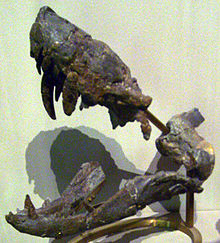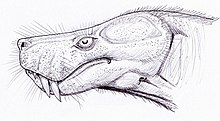Lycosuchus ("wolf crocodile") is an extinct genus of carnivorous therocephalians which lived in the Middle Permian 265—260 Ma existing for approximately 5 million years. As a member of the Lycosuchidae, the genus represents one of the earliest diverging therocephalians. The type and only species, L. vanderrieti, is known from a handful of well-preserved specimens featuring the cranium and lower jaw; the holotype US D173 housed at the University of Stellenbosch, South Africa, is a near complete occluded skull.[1] Specimen MB.R. 995, housed at the Museum für Naturkunde Berlin, Germany, consists of a near complete and isolated lower jaw, along with a partial snout and brain case.[2] With the help of μCT data, Pusch et al (2020) [2] described the endocranial anatomy of Lycosuchus vanderrieti.
| Lycosuchus Temporal range: Middle Permian,
| |
|---|---|

| |
| Lycosuchus vanderrieti skull (MB.R.995) at the Museum für Naturkunde, Berlin | |
| Scientific classification | |
| Domain: | Eukaryota |
| Kingdom: | Animalia |
| Phylum: | Chordata |
| Clade: | Synapsida |
| Clade: | Therapsida |
| Clade: | †Therocephalia |
| Family: | †Lycosuchidae |
| Genus: | †Lycosuchus Broom, 1903 |
| Species: | †L. vanderrieti
|
| Binomial name | |
| †Lycosuchus vanderrieti Broom, 1903
| |

It was a medium-sized predator, reaching 1.2 m (3.8 ft) in length with a skull 23 cm long.,[3] typical of early therocephalians. L. vanderrieti bore two functional canines in each maxilla, possibly due to a protracted tooth replacement.[2] Both the upper canines and the single canine of the lower jaw are serrated.
Discovered in South Africa, it was named by paleontologist Robert Broom[4] in 1903 and later assigned by him to Therocephalia.
See also
editNotes and references
edit- ^ J.A. Van den Heever (1987) The comparative and functional cranial morphology of the early Therocephalia (Amniota: Therapsida) p. 322
- ^ a b c Pusch, Luisa C.; Ponstein, Jasper; Kammerer, Christian F.; Fröbisch, Jörg (2020). "Novel Endocranial Data on the Early Therocephalian Lycosuchus vanderrieti Underpin High Character Variability in Early Theriodont Evolution". Frontiers in Ecology and Evolution. 7: 1–27. doi:10.3389/fevo.2019.00464.
- ^ T.S. Kemp (2005) The origin and evolution of mammals p.55
- ^ R. Broom (1913) A revision of the reptiles of the Karroo
- R. Broom (1913) A revision of the reptiles of the Karroo. Annals of the South African Museum 7(6):361-366
External links
edit- http://fossils.valdosta.edu/fossil_pages/fossils_per/t72.html Cast of skull and jaw courtesy of the National Museum, Bloemfontein South Africa